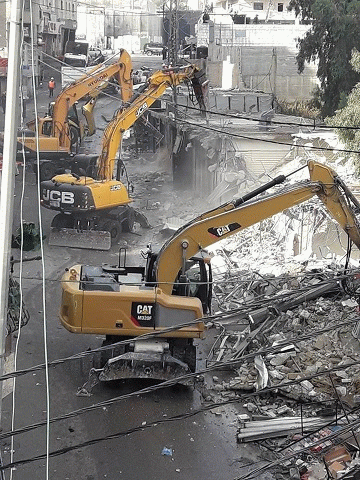
The message is: 'You either accept your subjugation or leave''
(Image by The Times of Israel) Details DMCA
The 350,000 Palestinian inhabitants of occupied East Jerusalem are caught between a rock and hard place, as Israel works ever harder to remove them from the holy city in which they were born, analysts and residents warn.
That process, they say, has only accelerated in the wake of US President Donald Trump's decision a year ago to relocate the American embassy to Jerusalem, effectively endorsing the city as Israel's exclusive capital.
"Israel wants Palestinians in Jerusalem to understand that they are trapped, that they are being strangled, in the hope they will conclude that life is better outside the city," said Amneh Badran, a politics professor at Jerusalem's Al Quds university.
Since Israel seized the eastern part of Jerusalem in 1967 and then illegally annexed it in 1981, it has intentionally left the status of its Palestinian population unresolved.
Israeli officials have made Palestinians there "permanent residents," though, in practice, their residency is easily revoked. According to Israel's own figures, more than 14,500 Palestinians have been expelled from the city of their birth since 1967, often compelling their families to join them in exile.
Further, Israel finished its concrete wall slicing through East Jerusalem three years ago, cutting some 140,000 Palestinian residents off from the rest of the city.
A raft of well-documented policies including house demolitions, a chronic shortage of classrooms, lack of public services, municipal underfunding, land seizures, home evictions by Jewish settlers, denial of family unification, and police and settler violence have intensified over the years.
At the same time, Israel has denied the Palestinian Authority, a supposed government-in-waiting in the West Bank, any role in East Jerusalem, leaving the city's Palestinians even more isolated and weak.
All of these factors are designed to pressure Palestinians to leave, usually to areas outside the wall or to nearby West Bank cities like Ramallah or Bethlehem.
"In Jerusalem, Israel's overriding aim is at its most transparent: to take control of the land but without its Palestinian inhabitants," said Daoud Alg'ol, a researcher on Jerusalem.
Like others, Mr Alg'ol noted that Israel had stepped up its 'Judaisation' policies in Jerusalem since the US relocated its embassy. "Israel is working more quickly, more confidently and more intensively because it believes Trump has given his blessing," he said.
Demographic concerns dominated Israel's thinking from the moment it occupied East Jerusalem in 1967, and subordinated it to the control of Jewish officials in West Jerusalem in what Israel termed its newly "united capital".
City boundaries were expanded eastwards to attach additional Palestinian lands to Jerusalem and then fill in the empty spaces with a ring of large Jewish settlements, said Aviv Tartasky, a researcher with Ir Amim, an organisation that campaigns for equal rights in Jerusalem.
The goal, he added, was to shore up a permanent three-quarters Jewish majority to ensure Palestinians could not stake a claim to the city and to allay Israeli fears that one day the Palestinians might gain control of the municipality through elections.
Israel has nonetheless faced a shrinking Jewish majority because of higher Palestinian birth rates. Today, Palestinians comprise about 40 per cent of the total population of this artificially enlarged Jerusalem.
(Note: You can view every article as one long page if you sign up as an Advocate Member, or higher).





